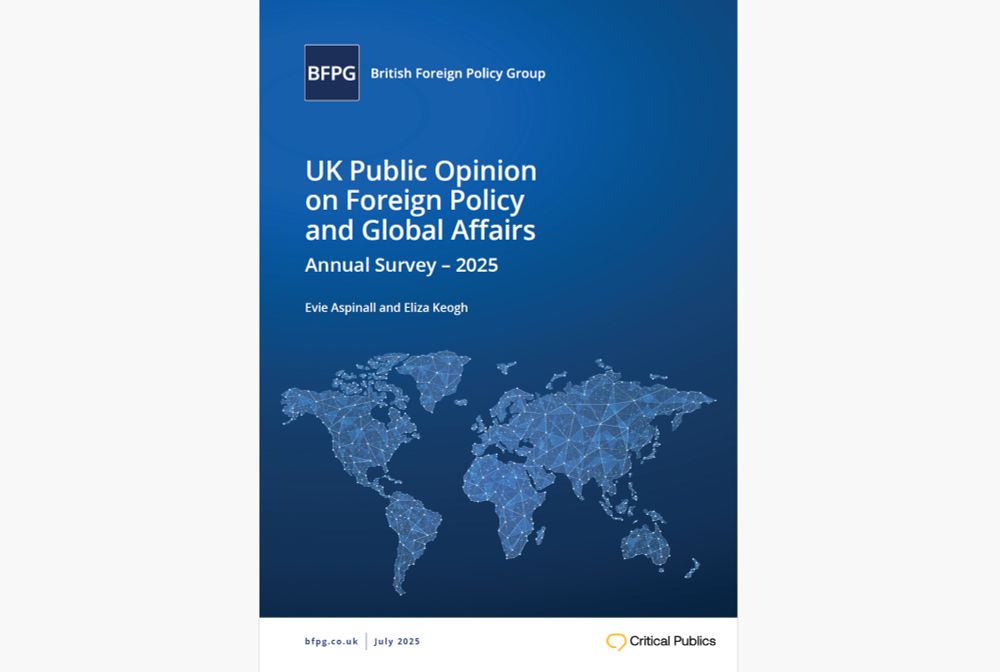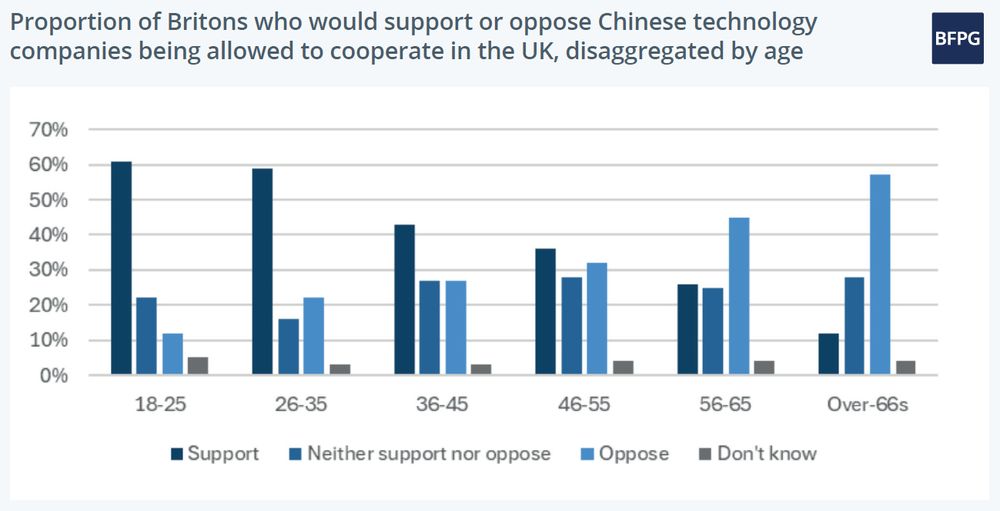British Foreign Policy Group
@bfpg.bsky.social
The full report is full of findings on everything from free trade to international development, China and trust in Government. Read the full report: bfpg.co.uk/2025/07/2025... (5/6)

2025 Annual Survey of UK Public Opinion on Foreign Policy - British Foreign Policy Group
BFPG's 2025 Annual Survey of Public Opinion on Foreign Policy finds that public trust in the US has plummeted, as Britons turn back towards Europe.
bfpg.co.uk
July 17, 2025 at 7:32 AM
The full report is full of findings on everything from free trade to international development, China and trust in Government. Read the full report: bfpg.co.uk/2025/07/2025... (5/6)
Major generational divides have emerged along a range of foreign policy themes.
🔹e.g. 46% of over-66s say Ukraine should be a top priority, vs 17% of 18-25s
🔹e.g. 61% of 18-25-year-olds support Chinese technology companies operating in the UK, vs just 12% of over-66s. (5/6)
🔹e.g. 46% of over-66s say Ukraine should be a top priority, vs 17% of 18-25s
🔹e.g. 61% of 18-25-year-olds support Chinese technology companies operating in the UK, vs just 12% of over-66s. (5/6)

July 17, 2025 at 7:32 AM
Major generational divides have emerged along a range of foreign policy themes.
🔹e.g. 46% of over-66s say Ukraine should be a top priority, vs 17% of 18-25s
🔹e.g. 61% of 18-25-year-olds support Chinese technology companies operating in the UK, vs just 12% of over-66s. (5/6)
🔹e.g. 46% of over-66s say Ukraine should be a top priority, vs 17% of 18-25s
🔹e.g. 61% of 18-25-year-olds support Chinese technology companies operating in the UK, vs just 12% of over-66s. (5/6)
Public support for defence spending is superficial.
✅ 71% support increase to 3% GDP now or in the next few years.
❌ However, Britons would oppose increasing defence spend if it required reducing spend on the NHS (60%), education (47%), or welfare (46%) (4/6)
✅ 71% support increase to 3% GDP now or in the next few years.
❌ However, Britons would oppose increasing defence spend if it required reducing spend on the NHS (60%), education (47%), or welfare (46%) (4/6)

July 17, 2025 at 7:32 AM
Public support for defence spending is superficial.
✅ 71% support increase to 3% GDP now or in the next few years.
❌ However, Britons would oppose increasing defence spend if it required reducing spend on the NHS (60%), education (47%), or welfare (46%) (4/6)
✅ 71% support increase to 3% GDP now or in the next few years.
❌ However, Britons would oppose increasing defence spend if it required reducing spend on the NHS (60%), education (47%), or welfare (46%) (4/6)
Instead Brits are turning to Europe:
🔹62% want to move closer to the EU
🔹Support for cooperation is deep: 83% support agreements to strengthen defence cooperation, 79% support reduced trade barriers on food & drink + 78% support ePassport gate access for Brits in Europe (3/6)
🔹62% want to move closer to the EU
🔹Support for cooperation is deep: 83% support agreements to strengthen defence cooperation, 79% support reduced trade barriers on food & drink + 78% support ePassport gate access for Brits in Europe (3/6)

July 17, 2025 at 7:32 AM
Instead Brits are turning to Europe:
🔹62% want to move closer to the EU
🔹Support for cooperation is deep: 83% support agreements to strengthen defence cooperation, 79% support reduced trade barriers on food & drink + 78% support ePassport gate access for Brits in Europe (3/6)
🔹62% want to move closer to the EU
🔹Support for cooperation is deep: 83% support agreements to strengthen defence cooperation, 79% support reduced trade barriers on food & drink + 78% support ePassport gate access for Brits in Europe (3/6)
🔻Trust in the US plummets, from 53% last year to 38% in 2025. More Britons also now distrust the US (41%) than trust it (38%). Strikingly, a potential Trump presidency (33%) is more widely seen as a top threat to UK security than terrorism (32%) or China (25%). (2/6)

July 17, 2025 at 7:32 AM
🔻Trust in the US plummets, from 53% last year to 38% in 2025. More Britons also now distrust the US (41%) than trust it (38%). Strikingly, a potential Trump presidency (33%) is more widely seen as a top threat to UK security than terrorism (32%) or China (25%). (2/6)

